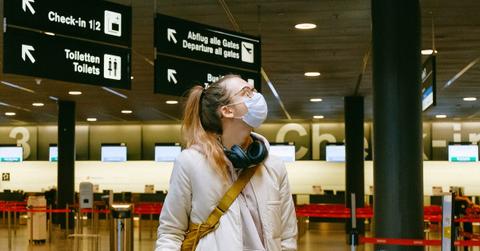Planning Your Next Trip? Here’s What The COVID Test Updates Mean For You

The Biden administration announced an end to the policy that requires international travelers to provide a negative COVID test before entering the U.S., marking the culmination of one of the last remaining travel mandates in the country. The policy, which has been in place since January 2021, ended June 12.
Below, find out more on how the update might change how you plan your travel and considerations for your next adventure:

1. The CDC supports the decision.
In a report from The Centers for Disease Control, officials agreed that the policy was no longer necessary. “CDC has determined that travelers have access to tools (e.g., vaccines, therapeutics, and recommended prevention measures) and guidance that allow travelers to make informed choices about the use of pre-departure testing and other prevention measures,” the report states.
The CDC also noted that the policy will be re-evaluated after 90 days and is subject to be reinstated. It will also continue to recommend that travelers boarding a flight to the U.S. get tested with a viral test as close to the time of departure as possible and not travel if they are sick. They also urge travelers to test for infection after travel and after being exposed to COVID-19.
While masks are no longer required in indoor public transportation settings, the agency still recommends them to ward off contracting the virus.
2. The reaction from the public has been mixed.
In response to NPR’s post about the policy lift on Twitter, users flocked to the platform to share their opinions on the matter.
@IanusJWolf wrote, “Wishing the pandemic was over doesn’t mean it’s over, especially when we have cases rising once more,” while another named @TheatreofZen wrote, “Thank God! This clears my trip home from the UK in December.”
Each user shared a different perspective on the matter, attributing different pros and cons to the lift. Some pros are that consumers will no longer have to pay for the required testing or wait in long lines to show proof, while a con is that people are less comfortable flying.
3. Health experts say the decision marks a new era of the pandemic that focuses on personal choices.

In a statement to The Washington Post, Henry Wu, associate professor of infectious diseases at Emory University’s School of Medicine and director of the Emory TravelWell Center, said that we are entering a phase of the pandemic that focuses more on personal responsibility.
“It’s just becoming more of a personal assessment of your risk tolerance,” he said. “The good news is these recent cases tend to be milder, particularly if you’re vaccinated or boosted, so the concern is much less than it was before.”
With more COVID policies being lifted, all citizens are going to have to make their own decisions about how to protect themselves.
4. The travel industry is celebrating the lift.

While the policy change has been met with mixed reactions on social media, the travel industry is thanking the administration for the move. Industry officials have been asking the administration to lift the requirement for months now, writing an open letter to the coronavirus response coordinator, Ashish Jha, last month urging the guideline to be lifted.
“The Biden administration is to be commended for this action, which will welcome back visitors from around the world and accelerate the recovery of the U.S. travel industry,” Roger Dow, president of the U.S. Travel Association, said in a statement.
With COVID guidelines playing a key role in slowing economic recovery for the travel sector, the policy lift is win for the economy.






